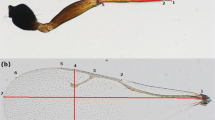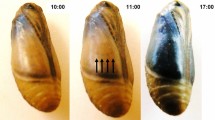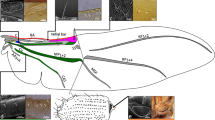Abstract
IN the genus Sitona some of the species are fully winged, but in others the wings are so reduced in size that flight is impossible. In at least two species wing dimorphism occurs. One, S. humeralis Steph., is described by Grandi from Italy as having brachypterous wings, but all the specimens of this species which I have examined from England are macropterous; in the other, S. hispidula F., I find that fully winged and brachypterous individuals are common and widely distributed throughout Britain. In the brachypterous form the wings are very small and have a truncated appearance owing to the absence of the apical portion which, in the normal wing, is bent under in repose. Examples of wing dimorphism have been recorded in other beetles, usually in genera which contain both macropterous and brachypterous species, but no investigation appears to have been made to ascertain whether the two forms interbreed, and if so, how the wing condition is inherited.
This is a preview of subscription content, access via your institution
Access options
Subscribe to this journal
Receive 51 print issues and online access
$199.00 per year
only $3.90 per issue
Buy this article
- Purchase on Springer Link
- Instant access to full article PDF
Prices may be subject to local taxes which are calculated during checkout
Similar content being viewed by others
Author information
Authors and Affiliations
Rights and permissions
About this article
Cite this article
JACKSON, D. The Inheritance of Brachypterous and Macropterous Wings in Sitona hispidula. Nature 118, 192–193 (1926). https://doi.org/10.1038/118192a0
Issue Date:
DOI: https://doi.org/10.1038/118192a0
This article is cited by
-
Kreislauf-Minutenvolumen und Schlag-Volumen Nach der Peripherie-Herz-Atem-Koppelungsregel
Klinische Wochenschrift (1937)
Comments
By submitting a comment you agree to abide by our Terms and Community Guidelines. If you find something abusive or that does not comply with our terms or guidelines please flag it as inappropriate.



